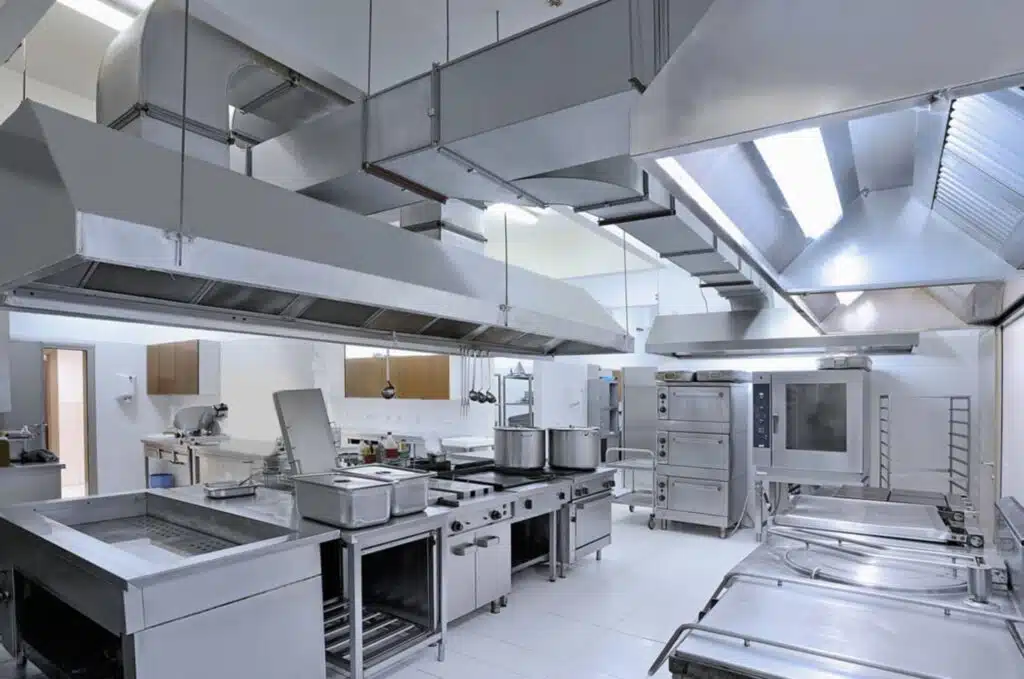25 Aug What Kitchen Managers Should Know About Grease Build-Up and Fire Safety
In any busy commercial kitchen, grease is a constant by-product of cooking. It doesn’t just settle on surfaces or extractor hoods; it’s pulled into your ventilation system, clings to duct walls, and accumulates out of sight. Over time, this hidden build-up becomes one of the biggest fire hazards in foodservice environments and the biggest threat to commercial kitchen safety.
Staying on top of extraction system hygiene is critical for cleanliness, compliance, insurance validity, and safety. A fire could put lives at risk and destroy years of business building. Read on to protect your team, your customers, and your livelihood.
Why Grease Build-Up Happens in Commercial Kitchens
Grease accumulation occurs naturally during normal cooking operations. High-temperature cooking methods (frying, grilling, and roasting) generate microscopic grease particles that become airborne. Your kitchen’s extraction system captures these particles through filters and ductwork, but they don’t just vanish into the atmosphere. Fine particles escape, condensing further along the system – inside the canopy, within the ducting, and around fans.
Without regular, professional kitchen ventilation cleaning, layers of thick, sticky residue can accumulate in a matter of weeks, particularly in bends, corners, and hard-to-reach areas. Extract fans themselves also become coated, reducing their efficiency over time.
The Hidden Fire Risk of Grease Build-Up
Grease deposits turn your extraction system into a potential fire hazard. Grease is highly flammable, and kitchen fires caused by this buildup aren’t rare. It’s one of the most common starting points for fires in commercial kitchens. And once it ignites, a fire will spread rapidly through your entire extraction system, moving through the ducts, hidden from view and difficult to contain. This type of fire moves faster than traditional suppression systems can respond, often reaching roof spaces before detection occurs.
This rapid spread pattern makes grease fires particularly dangerous and destructive. Worse still, if the ducting hasn’t been professionally cleaned, your insurance may not cover the damage. Grease fires produce toxic smoke that spreads quickly through connected spaces and causes long-term damage to property and equipment. Recovery from a grease fire often requires complete system replacement and extensive building restoration.
Grease also insulates heat and blocks airflow, putting strain on your extraction system. Extract fans have to work harder to maintain airflow, generating additional heat that brings the system closer to ignition temperatures, creating unsafe conditions for your team.
Fire Safety Responsibilities for Kitchen Managers
If you oversee a commercial kitchen, fire safety falls under your remit, and that includes the ventilation system. You’re legally responsible for ensuring it’s maintained and cleaned in accordance with recognised guidance. The Regulatory Reform (Fire Safety) Order 2005, for example, places clear duties on responsible persons to assess fire risks and implement appropriate control measures for kitchen fire prevention. This includes maintaining extraction systems in safe working condition.
TR19® Grease is the industry-standard document for kitchen ventilation cleaning in the UK, published by BESA (Building Engineering Services Association). It outlines how often systems should be cleaned, depending on kitchen usage, and specifies what constitutes compliant cleaning and reporting.
Insurers typically require proof (i.e. documentation) of TR19-compliant duct cleaning to validate your fire cover, and failure to comply can void your policy. You’ll need records showing regular cleaning schedules, system inspections, and any maintenance work completed. These records protect you legally and help insurance assessors understand your commitment to commercial kitchen safety standards.
How to Prevent Grease-Related Fires
Kitchen fire prevention requires a systematic approach combining daily cleaning practices with professional maintenance. Here are some steps you can follow:
- Check filters daily and train staff to clean or replace them according to manufacturer recommendations. While deep cleaning should be done professionally, good day-to-day hygiene slows down the build-up.
- Schedule regular inspections of your ductwork. If you can’t see inside it, you can’t know what’s happening.
- Work with certified kitchen ventilation cleaning experts. DIY cleaning won’t meet compliance standards and won’t touch the inaccessible parts of your system.
- Keep records of all cleaning and maintenance. Insurers and safety inspectors will expect to see documentation.
- Staff training ensures everyone understands their role in kitchen fire prevention. A quick, coordinated response can prevent minor incidents from becoming major disasters, but emergency procedures must be clearly defined and regularly practiced.
The Foundation of Commercial Kitchen Safety
Grease build-up might be invisible day to day, but the fire risk is real and preventable. Professional kitchen ventilation cleaning removes grease deposits that daily maintenance can’t address. A TR19-certified clean ensures that all accessible and non-accessible parts of the system, including horizontal and vertical ductwork, fans, and discharge points, are cleaned to a measurable standard.
As a kitchen manager, ensuring your extraction system is cleaned to TR19 standards is one of the most important safety decisions you can make to protect your business, team, and customers. Grease build-up is a serious but manageable risk in commercial kitchen operations.
Keep your kitchen safe and fire-free
At Deduct Ltd, we use industry-leading methods to remove grease from your entire ventilation system safely. Our team understands TR19 requirements and provides you with a full post-clean report for compliance. Regular kitchen extraction cleaning and maintenance also help your extraction system run more efficiently, improving air quality in the kitchen.
Don’t wait for a fire to realise what’s hiding in your ductwork. Contact us today to discuss your commercial kitchen safety requirements and schedule a professional cleaning to safeguard your kitchen.

